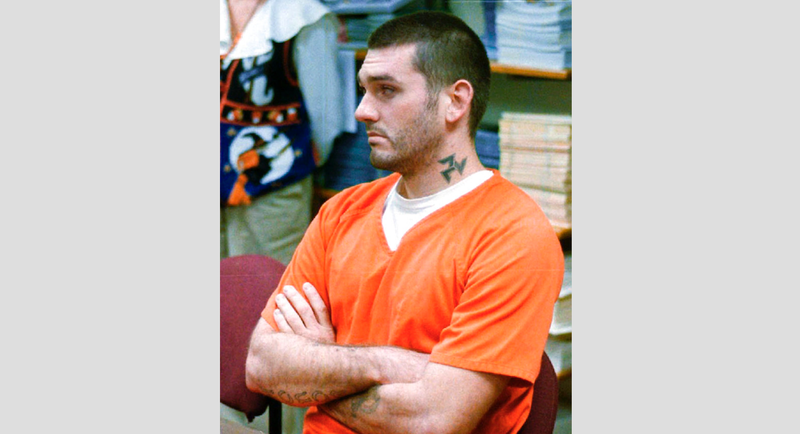Attorneys for a man scheduled to be executed by lethal injection next month are seeking a new DNA test in an effort to prevent the U.S. government from going forward with the death sentence.
Danny Lee, 46, a one-time member of a white supremacist group, was convicted in the Jan. 15, 1996, slaying of a rural Arkansas family. The three victims had their heads wrapped in plastic and were dumped in the Illinois Bayou in Pope County after Lee and his accomplice, Chevie Kehoe, taped rocks to their bodies, prosecutors said.
Lee's attorneys, Morris Moon and George Kouros, filed their motion Friday in U.S. District Court in Little Rock. They requested the hair sample be compared with the DNA of "alternate suspects" originally named in the case.
Last week, the U.S. Department of Justice announced Lee's execution is scheduled for July 13. If it moves forward, Lee would be the first death row inmate to be executed by the U.S. government in 17 years.
Another of Lee's attorneys, Ruth Friedman, stated in a news release Friday that the hair sample in question was tested by an independent lab in 2007, which "conclusively excluded" Lee as the source.
Attorneys said federal prosecutors at the time of the 1999 trial convinced a jury that Lee was guilty of the murders "based largely" on what seemed to be damning evidence at the time.
"The stakes in this litigation could not be higher," Friedman wrote. "The government is rushing to execute Danny Lee despite lingering questions about the prosecution's case. The government should want to know the truth just as much as Mr. Lee does, and should use all available tools to ensure the truth comes out before carrying out the irrevocable step of executing him. There is no compelling reason to forgo this testing."
Prosecutors said Lee and Kehoe entered the Tilly-area home of William Mueller; his wife, Nancy Mueller; and her 8-year-old daughter, Sarah Powell. Jurors were told that Lee and Kehoe had dressed in makeshift FBI uniforms, waited for the family to come home and then sprung out from hiding places pretending they were carrying out a raid. The family was then murdered.
The victims' bodies were found in the water near Russellville months after they were killed. A medical examiner could not conclude whether they asphyxiated from the plastic wrapped around their heads or drowned.
Among the items introduced into evidence at the trial was a cap left behind by the killers, which contained a hair that prosecutors said was matched to Lee.
In their motion, defense attorneys argued that the hair ought to be compared with the DNA of other suspects originally named in the case, including the first lead suspect, identified in court documents as Paul Humphrey, who lived near the Muellers.
Humphrey became a suspect after one of Nancy Mueller's relatives told authorities that he was in possession of the titles to the Muellers' abandoned vehicle and trailer, the motion stated. Attorneys said Humphrey subsequently gave "bizarre and false" statements to investigators.
Kehoe was arrested in June 1997 in Utah and Lee was arrested a couple months later in Oklahoma. The men were tried together, and jurors recommended a life sentence for Kehoe and a death sentence for Lee.
Nancy Mueller's family has told the media they think jurors got it wrong.
"If anyone should've gotten the death penalty, it should've been Chevie Kehoe," Paul Branch, Nancy Mueller's brother and Sarah Powell's uncle, told an Arkansas Democrat-Gazette reporter last November at his home in Hector. He said Kehoe was the mastermind behind the murders and called him "an evil person."
In their filing, Lee's attorneys said federal investigators, once they took over the case from local authorities, started focusing on Lee after interviewing two of Kehoe's relatives. The investigators did so even though Humphrey was never ruled out as a suspect by local detectives, according to the motion.
"The Government should be ordered to do everything in its power to determine whose hair was in the FBI cap it claimed was worn during the crime," Moon and Kouros wrote in their filing.
They went on to say that with the passage of time, the government's case against Lee "has only become substantially weaker." They have said that others involved in the trial also think so.
Friedman said the judge and the lead prosecutor made public statements opposing Lee's execution years after the verdict.
"Additionally, the government has repeatedly sought to inflame public opinion by exploiting Mr. Lee's physical appearance, despite the fact that he long ago renounced the skinhead groups he joined as a teenager," Friedman said.
A spokesman for the Justice Department in Washington, D.C., could not be reached for comment Friday.
Lee was originally scheduled to be executed in December 2019, but a U.S. District Court judge in Washington stayed the execution on the basis that Attorney General William Barr was "short-circuiting" the process by not having Congress vote on the newly implemented single-drug injection for condemned killers.
Previously, the lethal injection was made up of a three-drug mixture. In 2014, President Barack Obama instructed the Justice Department to review its use of lethal injections.
Barr announced in July 2019 that the review was finished, which opened the door for federal executions to resume.
